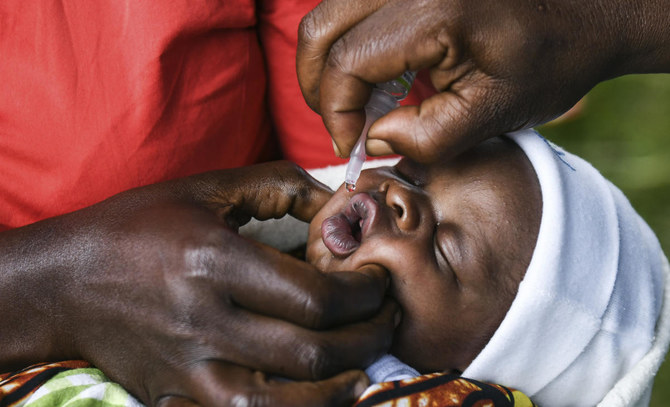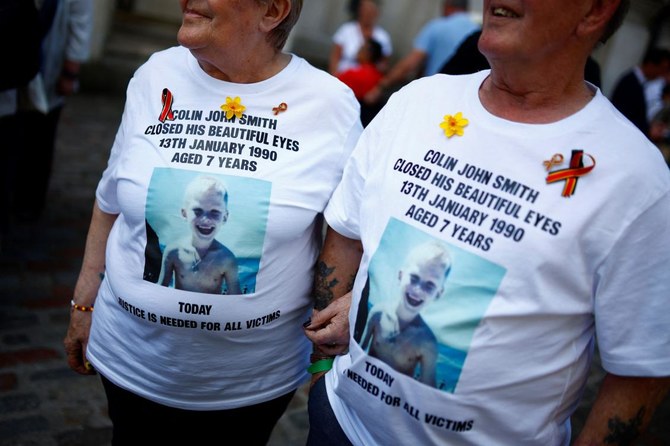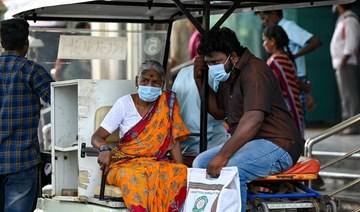JOHANNESBURG: Nearly 13 million children missed one or more vaccinations in Africa between 2019 and 2021 because of the disruptive impact of the COVID-19 pandemic, leaving the continent vulnerable to even more outbreaks of disease and facing a “child survival crisis,” a new report from UNICEF said Thursday.
Amid a global “backslide” in childhood immunization over those three years, which the United Nations Children’s Fund said is the worst regression for childhood vaccinations in 30 years, Africa is the region with the highest number of unvaccinated and under-vaccinated children. UNICEF said that 12.7 million African children missed one or more vaccinations and 8.7 million didn’t receive a single dose of any vaccine from 2019-2021.
The report, “The State of the World’s Children 2023,” confirms previous indications and lays out more data showing that the pandemic “interrupted childhood vaccination almost everywhere,” UNICEF said.
Half of the 20 countries in the world with the largest number of children without any vaccinations — referred to as “zero-dose” children — are in Africa, UNICEF said. In Nigeria, 2.2 million children have never received a vaccination. In Ethiopia, 1.1 million are unvaccinated against diseases.
UNICEF’s report comes as Africa, but also other parts of the world, report disease outbreaks on a scale not seen in years. In the southern African nation of Malawi, more than 1,000 people died in a cholera outbreak at the start of the year, the worst there in 20 years. Nearly 700 children died in a measles outbreak in Zimbabwe last year. Most of the Zimbabwean children were unvaccinated against the disease, authorities said.
UNICEF said the “intense demands on health systems, the diversions of immunization resources to COVID-19 vaccination, health worker shortages and stay-at-home measures” all contributed to missed vaccinations across the world. So did conflicts, climate change and vaccine hesitancy.
But in Africa, the pandemic exposed and exacerbated the “lack of resilience and persistent weaknesses in health systems and primary health care,” UNICEF said.
Last year, 34 of the 54 countries in Africa experienced disease outbreaks such as measles, cholera and poliovirus, UNICEF said, adding there’s a “child survival crisis” on the continent.
The resurgence of those diseases should serve as a clear warning for Africa, said Mohamed M. Fall, UNICEF Regional Director for Eastern and Southern Africa.
“African leaders must act now and take strong political action to reduce the gap in vaccination and make sure that all children are immunized and protected,” he said.
UNICEF noted that children born just before or during the pandemic were now moving past the age when they would normally be vaccinated and stressed the need for health authorities to “catch up” with those missed vaccinations to prevent more deadly disease outbreaks.
Also Thursday, the World Health Organization released its assessment, saying Africa needs to vaccinate an estimated 33 million children by 2025 to get “back on track” and recover from the COVID-19 pandemic’s “disruptive wake.”
UNICEF: 12.7 million children in Africa missed vaccinations
https://arab.news/8vm9w
UNICEF: 12.7 million children in Africa missed vaccinations

- The report, “The State of the World's Children 2023,” confirms previous indications
- Half of the 20 countries in the world with the largest number of children without any vaccinations — referred to as “zero-dose” children — are in Africa, UNICEF said
Indonesia, UAE to build mangrove research center in Bali

- Countries are part of Mangrove Alliance for Climate launched at COP27
- Southeast Asian country is home to about 23% of global mangrove ecosystems
JAKARTA: Indonesia and the UAE are collaborating to build a mangrove research center in Bali as part of a partnership to promote nature-based solutions to climate change.
The Southeast Asian country is home to about 23 percent of all mangrove ecosystems in the world. In the face of climate change, mangroves are essential in protecting coastal communities against rising sea levels and capturing massive amounts of emissions and greenhouse gases from the atmosphere.
At COP27, the 2022 UN climate summit held in Egypt, the archipelagic country partnered with the UAE to launch the Mangrove Alliance for Climate, an initiative focused on nature-based efforts to address issues related to climate change. It was later joined by dozens of other countries, including Australia and India.
As part of that cooperation, the two countries will start building an international mangrove research center in Bali, following a groundbreaking ceremony held over the weekend.
“This institution represents one of the UAE’s most important contributions in its partnership with Indonesia to promote nature-based solutions to address impacts of climate change in the two countries and in the world,” UAE Minister of Climate Change and Environment Dr. Amna bint Abdullah Al-Dahak said in a statement on Tuesday.
“Taking into consideration the significant decline of mangrove forests in the world, the UAE is aware that losing even more mangrove trees will worsen the impacts of climate change … this research center will work to create solutions.”
Al-Dahak attended the ceremony alongside Suhail Mohamed Al-Mazrouei, a special envoy of the UAE president, and Luhut Binsar Pandjaitan, Indonesia’s coordinating minister of maritime affairs and investment.
According to Indonesia’s Maritime Affairs and Investment Ministry, the center will focus on conducting research, conservation and providing education related to mangroves, particularly on harnessing biotechnology and innovative uses of artificial intelligence to identify and restore mangrove ecosystems.
“I’m proudly announcing that the International Mangrove Research Center will be built in a strategic location in Bali, which has already shown its success in preserving mangrove ecosystems and will garner international attention,” Pandjaitan said.
Indonesia has made mangrove planting a key feature in the international events that it hosts, including the Group of 20 Meeting in 2022 and the 10th World Water Forum, which runs until May 25. The research center will be built within the Ngurah Rai Forest Park, Bali’s largest mangrove conservation area covering about 1,300 hectares.
Police break up pro-Palestinian camp at the University of Michigan

- Video posted online by Detroit-area TV stations showed police moving people away from the camp on the Diag, a common site for campus protests
- The encampment had been set up in late April near the end of the school year
MICHIGAN: Police broke up a pro-Palestinian encampment Tuesday at the University of Michigan, less than a week after demonstrators showed up at the home of a school official and placed fake body bags on her lawn.
Video posted online by Detroit-area TV stations showed police moving people away from the camp on the Diag, a common site for campus protests. The encampment had been set up in late April near the end of the school year.
President Santa Ono said in a statement that the encampment had become a threat to safety, with overloaded power sources and open flames. Organizers had refused to comply with requests to make changes following an inspection by a fire marshal, he said.
“The disregard for safety directives was only the latest in a series of troubling events,” Ono said.
Protesters have demanded that the school’s endowment stop investing in companies with ties to Israel. But the university insists it has no direct investments and less than $15 million placed with funds that might include companies in Israel. That’s less than 0.1 percent of the total endowment.
“There’s nothing to talk about. That issue is settled,” Sarah Hubbard, chair of the Board of Regents, said last week.
A group of 30 protesters showed up at her house before dawn last week and placed stuffed, red-stained sheets on her lawn to resemble body bags. They banged a drum and chanted slogans over a bullhorn.
Masked protesters also posted demands at the doors of other board members.
“This conduct is where our failure to address antisemitism leads literally — literally — to the front door of my home,” board member Mark Bernstein, a Detroit-area lawyer, said at a board meeting last week. “Who’s next? When and where will this end? As a Jew, I know the answer to these questions because our experience is full of tragedies that we are at grave risk of repeating. Enough is enough.”
Students and others have set up tent encampments on campuses around the country to press colleges to cut financial ties with Israel. Tensions over the war have been high on campuses since the fall, but demonstrations spread quickly following an April 18 police crackdown on an encampment at Columbia University.
UK announces compensation package for blood scandal victims

- Damning report blames successive governments, officials and doctors for failures that resulted in more than 3,000 deaths
LONDON: Britain said on Tuesday it would begin making further interim compensation payments to the victims of the contaminated blood and blood products scandal.
“The government will be making further interim payments ahead of the establishment of the full scheme,” minister John Glen told parliament, a day after a damning report blamed successive governments, officials and doctors for failures that resulted in more than 3,000 deaths.
“Payments of 210,000 pounds will be made to living infected beneficiaries,” he added.
Prime Minister Rishi Sunak made a “wholehearted unequivocal apology for this terrible injustice” on Monday, adding that those affected would receive “comprehensive compensation.”
More than 14,000 displaced from Ukraine’s Kharkiv region: WHO

- WHO official in Ukraine: Conflict in Kharkiv ‘has significantly increased the number of trauma patients’
- UNHCR voices concerns that conditions in Kharkiv could become even more difficult if the ground assault and aerial attacks continue
GENEVA: More than 14,000 people have been displaced in recent days from Ukraine’s eastern Kharkiv region, where Russia launched a ground offensive on May 10, the World Health Organization said Tuesday.
The assault has seen Russian forces achieve their largest territorial gains in Ukraine in the last 18 months.
“Over the past two weeks, fighting in the Kharkiv region of Ukraine has severely escalated,” Jarno Habicht, the WHO’s representative in Ukraine, told a press briefing in Geneva, via video-link from Kyiv.
“Over 14,000 people have been displaced in a matter of days, and nearly 189,000 more still reside within 25 kilometers of the border with the Russian Federation, facing significant risks due to the ongoing fighting,” he said.
He said the UN health agency was using these figures after speaking with local authorities.
“With the worsening security situation, humanitarian needs in the region are growing, and growing fast,” Habicht said.
The conflict in Kharkiv “has significantly increased the number of trauma patients,” he added.
Russia launched its full-scale invasion of Ukraine in February 2022.
Since then, more than 20,000 amputations have been carried out, said Habicht.
And 200 ambulances per year, on average, have been damaged or destroyed in shelling attacks, “depriving the Ukrainian people of urgent care,” he added.
The UNHCR voiced concerns that conditions in Kharkiv — already home to 200,000 internally displaced people — could become even more difficult if the ground assault and aerial attacks continue.
“UNHCR, the UN refugee agency, is extremely worried about the worsening situation and resulting spike in humanitarian needs and forced displacement owing to the new ground offensive,” spokeswoman Shabia Mantoo told the Geneva briefing.
She said the Ukrainian authorities had evacuated more than 10,300 people from villages in the Kharkiv region’s border areas, while others have left by their own means.
“The majority of the evacuees, who had to escape their homes with only a few belongings, are already highly vulnerable and include mainly older people and those with low mobility or disabilities who were not able to flee earlier,” Mantoo said.
Those registered at a transit center in Kharkiv city have been given basic relief items and advised on accommodation options.
“The vast majority of evacuees have expressed a clear wish to stay with family members or in rental accommodation and collective sites in Kharkiv and not move further from their homes, to be able to return when the situation allows,” Mantoo said.
The United Nations’ 2024 humanitarian plan for Ukraine amounts to $3.1 billion this year. UN spokeswoman Alessandra Vellucci said that it was thus far only 23 percent funded.
1 dead, others injured after London-Singapore flight hit severe turbulence, Singapore Airlines says

- The airline said the aircraft was a Boeing 777-300ER with a total of 211 passengers and 18 crew on board
BANGKOK: Singapore Airlines says a person has died aboard and others were injured when a London-Singapore flight encountered severe turbulence.
Singapore’s Flight SQ321 from Heathrow was diverted to Bangkok and landed at 3:45 p.m. local time at Suvarnabhumi Airport, the airline announced in its Facebook page. The airline said the aircraft was a Boeing 777-300ER with a total of 211 passengers and 18 crew on board.
Local emergency crews from Samitivej Srinakarin Hospital were on site to transfer injured people off the runway for treatment. Videos posted on the LINE messaging platform by Suvarnabhumi Airport showed a line of ambulances streaming to the scene.


















